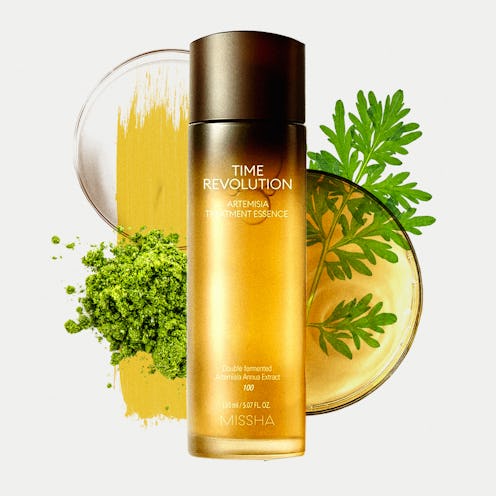(Back To Basics)
This Under-the-Radar Ingredient Is A K-Beauty Favorite For Sensitive Skin
Soothe irritation and bring back your glow.

With new products, brands, and categories popping up every day, beauty can be a bit overwhelming. Back to Basics is our rudimentary beauty series that serves as your crash course on the science behind some of the best formulations in the game.
Sensitive skin is a difficult thing to deal with for everyone. Whether it manifests as rosacea, eczema, psoriasis, or something else entirely, it can create unique challenges when it comes to curating an effective skin care routine. On one hand, you want to use products that work — those that will bring you closer to your specific skin care goals. On the other, you want to avoid excess redness and irritation, which means you keep a wide berth around anything that could possibly prove to be too harsh for your skin, like exfoliating acids or retinoids. Where does that leave you? Enter mugwort.
“[Mugwort] is a perennial plant native to Asia and Northern Europe and can be found in North America too. It’s part of the Artemisia genus, which also houses wormwood,” reveals Charlotte Cho, co-founder of Soko Glam and founder of Then I Met You. And while there is a range of skin soothing options available, from grapeseed oil to colloidal oatmeal, the decidedly un-sexy sounding ingredient actually deserves much more attention than it has gotten in the larger skin care market.
Mugwort might be relatively unknown in the U.S, but it has been used for centuries in Korea. “Mugwort has long been used in Korean culture for medicinal and wellness purposes,” says Cho. “Many Korean women are known to drink mugwort tea for menstrual cramps. It’s also highly regarded for its healing properties, as well as its anti-inflammatory and soothing benefits.” That explains why it can be found in so many K-beauty products that are available today. After all, K-beauty is a space where Cho says, “gentle formulations reign supreme.”
Want to know more about what this under-the-radar ingredient can do for your sensitive skin. Keep reading for why the experts recommend mugwort time and time again.
What Are the Benefits of Mugwort?
Cosmetic chemist Ron Robinson of BeautyStat.com explains that mugwort offers myriad skin benefits although its soothing qualities are really what makes it shine. “It can help provide calming and anti-inflammatory benefits, as well as antibacterial and anti-fungal benefits,” he says. “It might also provide antioxidant benefits as well.”
So whether your skin is facing irritation from external factors (such as sun damage, pollution, or even testing another beauty product that didn’t sit well with your skin) or you just have naturally sensitive skin, using a topical product that contains mugwort can provide some much needed relief.
NYC-based dermatologist Dr. Marisa K. Garshick agrees. “It is soothing so it can help treat dry and irritated skin,” she says. “Additionally, it has been shown to improve dry skin in those with atopic dermatitis. It also can be good for those with acne-prone skin because of the antibacterial and anti-inflammatory benefits.” As for those aforementioned antioxidant benefits? Dr. Garshick says it can “help to protect the skin against free radical damage,” which can appear in the form of sun exposure, pollution, and even stress.
Who Is Mugwort Best Suited For?
Mugwort is often found in skin care products that are formulated for rosacea and acne-prone skin types, although it can benefit all skin types, including dry and mature skin. “Sensitive skin types truly love this ingredient,” Cho tells TZR. “Mugwort’s soothing benefits make it a top-choice ingredient for those who have rosacea, eczema, atopic dermatitis, psoriasis, and even acne.”
Are There Any Potential Risks of Mugwort?
While it provides benefits for most skin types, including sensitive skin, Dr. Garshick still recommends proceeding with caution. “In general, those with sensitive skin should always be cautious when incorporating new products into a routine,” she says. “Do a small patch test first to check for any sensitivities.” Most skin care professionals will suggest applying a small amount of product to the inside of your wrist (where your skin is softest) for 3-5 days. If you don’t see any redness or other form of irritation, it should be safe to use it on your complexion.
Overall, mugwort is an effective ingredient for soothing even the most sensitive skin. It offers anti-inflammatory, antibacterial, and anti-fungal benefits, and it could even help protect your skin against free radical damage. And as summer comes to a close and lingering sun damage might be top of mind, now is an ideal time to try incorporating it into your daily skin care routine.
Ahead, check out five expert-recommended mugwort skin care products to shop now.
We only include products that have been independently selected by The Zoe Report's editorial team. However, we may receive a portion of sales if you purchase a product through a link in this article.